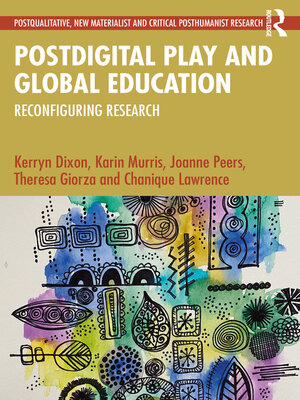Postdigital Play and Global Education
ebook ∣ Reconfiguring Research · Postqualitative, New Materialist and Critical Posthumanist Research
By Kerryn Dixon

Sign up to save your library
With an OverDrive account, you can save your favorite libraries for at-a-glance information about availability. Find out more about OverDrive accounts.
Find this title in Libby, the library reading app by OverDrive.



Search for a digital library with this title
Title found at these libraries:
| Library Name | Distance |
|---|---|
| Loading... |
Postdigital Play and Global Education: Reconfiguring Research is a re-turn to a large-scale, international project on children's digital play. Adopting postqualitative and posthumanist theories, research practices are reconfigured all the way down from what counts as 'data', 'tools', 'instruments', 'transcription', research sites', 'researchers', to notions of responsibility and accountability in qualitative research. Through a series of vignettes involving complex human and more-than-human collaborators (e.g., GoPros, octopus, avatars, diaries, sackball, LEGO bricks), the authors challenge who and what can be playful and creative across contexts in the global north and global south. The diffractive methodology enacted interrupts Western developmental notions of agency that are dominant in research involving young children.
The concept of 'postdigital' offers fresh opportunities to disrupt dominant understandings of children's play. Play emerges as an enigmatic and shape-shifting human and more-than-human agentic force that operates beyond digital/non-digital, online/ offline binaries. By attuning to race, gender, age and language, invisible and colonising aspects of postdigital worldings the authors show how global education research can be reimagined through a posthumanist decentering of children without erasure.
Postdigital Play and Global Education puts into practice Karen Barad's agential realism, but also a range of postdevelopmental and posthumanist writings from diverse fields. The book will be of particular interest to researchers looking for guidance to enact agential realist and posthumanist philosophies in research involving young children.







